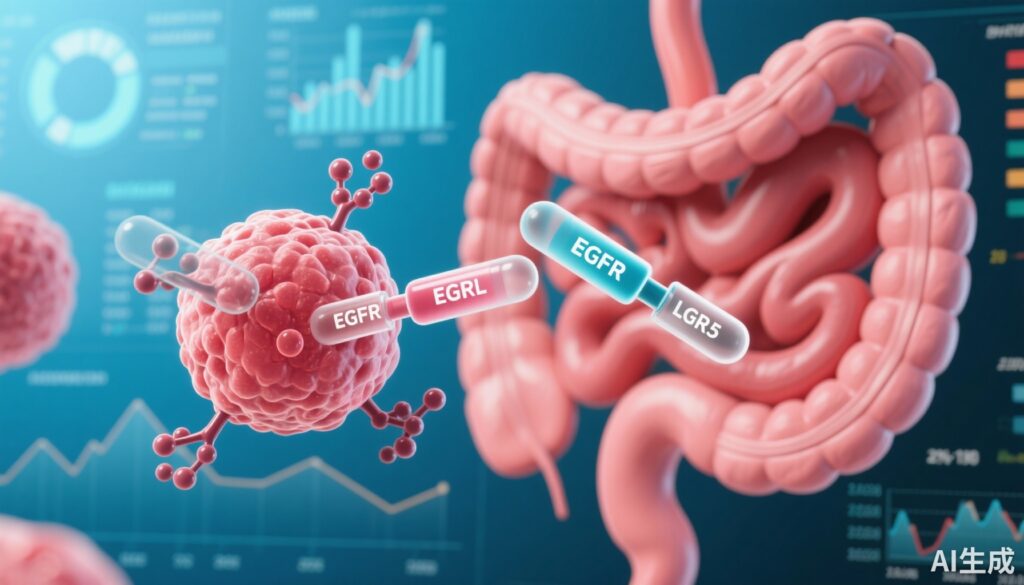Highlight
Merus has presented compelling mid-phase clinical evidence for petosemtamab, a dual-specificity antibody targeting EGFR and LGR5, demonstrating high objective response rates in metastatic colorectal cancer (mCRC). The combination with standard chemotherapy regimens FOLFOX/FOLFIRI yielded a 100% response rate in first-line (1L) left-sided mCRC, and an overall response rate (ORR) of 90% was observed. In second-line (2L) treatment, the ORR was 62%, while later line (3L+) single-agent therapy achieved a 10% response rate. Safety profiles were consistent with prior observations and no new signals were detected.
Study Background
Metastatic colorectal cancer remains a significant clinical challenge globally, with molecular heterogeneity and variable response rates to standard chemotherapy and targeted agents. Anti-epidermal growth factor receptor (EGFR) monoclonal antibodies have improved outcomes in select mCRC subsets, particularly those with RAS/BRAF wild-type tumors. However, resistance mechanisms and limited efficacy especially in right-sided tumors remain obstacles. Therefore, significant unmet need exists for novel therapeutics that can enhance efficacy while maintaining safety.
Petosemtamab, a humanized full-length IgG1 antibody, targets both EGFR and leucine-rich repeat-containing G-protein coupled receptor 5 (LGR5), a marker implicated in colorectal cancer stem cells responsible for tumor proliferation and resistance. Its multimodal mechanisms include inhibition of EGFR signaling, promotion of EGFR internalization and degradation facilitated by LGR5 binding, and enhanced antibody-dependent cellular cytotoxicity (ADCC) and phagocytosis (ADCP). These actions promise to overcome typical resistance pathways and improve tumor control in mCRC.
Study Design
The ongoing Phase 2 clinical trial includes metastatic colorectal cancer patients stratified according to treatment line and tumor location. A total of 54 patients with left- and/or right-sided, RAS/BRAF wild-type, microsatellite stable (MSS) mCRC were enrolled. Patients received biweekly 1500 mg petosemtamab combined with FOLFOX or FOLFIRI chemotherapy in first-line (1L) and second-line (2L) settings, or petosemtamab monotherapy in third-line (3L) and beyond. Notably, 1L and 2L patients had not been previously treated with anti-EGFR agents, whereas 3L+ patients had experienced at least two prior regimens including anti-EGFR therapy.
Eligibility for efficacy analysis mandated administration of at least one dose of petosemtamab, a minimum of 8 weeks follow-up, and at least one post-baseline tumor assessment or early discontinuation due to progression, clinical worsening, or death.
Key Findings
First-Line Therapy (1L): Fourteen patients received petosemtamab plus FOLFOX/FOLFIRI; ten were evaluable for efficacy with eight having left-sided tumors. Among these, the objective response rate was 80% (8 of 10), including one confirmed complete response (CR) and seven partial responses (PR), three unconfirmed. In left-sided tumors, response rate was 88% (7/8) initially, improving to 100% (8/8) following reclassification of one stable disease (SD) to unconfirmed PR after data cutoff. Overall 1L ORR rose to 90% considering all evaluable patients, with all unconfirmed PRs persisting without progression.
Second-Line Therapy (2L): Fourteen patients treated with petosemtamab plus chemotherapy (mostly FOLFIRI) were assessed; 13 were evaluable. The ORR was 62% (8/13), composed entirely of partial responses, including some unconfirmed. The remainder exhibited stable disease or early clinical worsening prior to first imaging. Unconfirmed PR and SD patients remained on therapy without progression.
Third-Line and Beyond (3L+): Twenty-six patients received petosemtamab monotherapy; 20 were evaluable. The ORR was modest at 10% (two partial responses), with nine patients achieving stable disease. Treatment persisted in five SD cases without progression.
Safety Profile: Petosemtamab was well tolerated across treatment lines, with safety consistent with previous studies in recurrent/metastatic head and neck squamous cell carcinoma. Co-administration with FOLFOX/FOLFIRI did not lead to additional or unexpected toxicity. No new safety signals emerged.
Expert Commentary
The observed efficacy of petosemtamab combined with standard chemotherapy in the first-line setting, particularly the striking 100% response rate in left-sided mCRC tumors, is a significant advance. Left-sided colorectal cancers typically respond better to anti-EGFR therapy, and petosemtamab’s dual targeting mechanism may amplify this effect through simultaneous EGFR pathway blockade and LGR5-mediated tumor stem cell targeting. By promoting EGFR internalization and degradation, the antibody may overcome resistance mechanisms that limit current EGFR-directed therapies.
Second-line results demonstrate promising disease control after chemotherapy failure, though with lower response rates, which is consistent with increasing drug resistance. The diminished efficacy of single-agent petosemtamab in heavily pretreated patients highlights the challenge of late-line mCRC treatment but still suggests some activity worth further exploration.
Safety data reassuringly support the combination use without exacerbating chemotherapy-associated toxicity, critical for clinical implementation.
Limitations include the relatively small sample size and preliminary nature of the data, with some responses unconfirmed at data cutoff. Longer follow-up is necessary to assess durability and survival benefit. Inclusion was limited to MSS and RAS/BRAF wild-type tumors, restricting generalizability to broader mCRC populations. Future randomized trials will be crucial to validate these findings.
Conclusion
Petosemtamab, a novel dual-specific antibody targeting EGFR and LGR5, shows robust anti-tumor activity combined with standard chemotherapy in first- and second-line treatment of metastatic colorectal cancer, especially in left-sided tumors. Its distinct mechanisms may overcome resistance barriers seen with existing therapies. The safety profile supports further development. These promising mid-phase results warrant progression to larger, controlled trials to confirm clinical benefit and define its role in mCRC management. Petosemtamab represents a potential advancement addressing unmet therapeutic needs in this difficult-to-treat cancer subset.
Funding and Trial Registration
The clinical trial is sponsored by Merus, the developer of petosemtamab. Specific trial registration numbers were not provided in the release.
References
- Cunningham D et al. Cetuximab monotherapy and cetuximab plus irinotecan in irinotecan-refractory metastatic colorectal cancer. N Engl J Med. 2004;351(4):337-345.
- Van Cutsem E et al. Efficacy of first-line chemotherapy with or without anti-EGFR therapies in mCRC: A meta-analysis. Lancet Oncol. 2017;18(1):47-63.
- de Souza P, et al. LGR5 in colorectal cancer stem cells: signaling pathways and therapeutic targeting. Int J Mol Sci. 2020;21(4):1395.
- Merus press release, June 2024. Merus announces positive interim data from Phase 2 petosemtamab trial in metastatic colorectal cancer.



